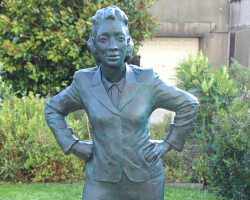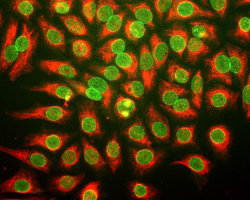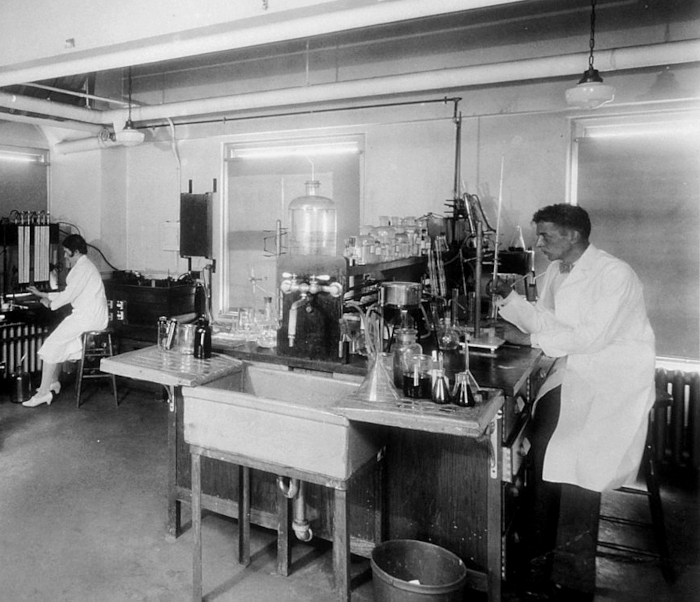show/hide words to know
Cell line: cells (and the cells they make by dividing) that are kept and grown for long periods of time......more
Cervical cancer: cancer of the cervix (the lower end of the uterus)......more
Subculturing: removing some cells from a culture and growing them in a new dish with fresh cell food......more
Is immortality possible?
Can we humans ever become immortal? Immortality might seem like a concept right out of a science fiction movie. However, in the purely technical sense, there are indeed some humans out there who are - well, immortal. Yes, really. Let’s find out more about one such woman who is technically immortal - Henrietta Lacks.
The curious case of Henrietta Lacks

Although there is a bronze statue of Henrietta Lacks, she did not receive any rewards or payment during her life. Image by 14GTR.
In 1951, a black woman named Henrietta Lacks walked into Johns Hopkins hospital with a severe illness. She was diagnosed with an aggressive form of cervical cancer. Her doctor quickly sent a biopsy of her cancer to a nearby lab run by Dr. George Gey.
Dr. Gey was at the time trying to establish a continuous culture of cancer cells from patient biopsy samples, called a cancer cell line. He believed this would help in performing long-lasting studies on cancer. He had attempted to establish a cancer cell line from several cancer biopsy samples in the past. Unfortunately, the cells soon died after a couple of cell divisions. However, cells from Lacks's biopsy sample never stopped dividing. This was because of her aggressive cancer type.
Although Lacks herself died at the young age of 31, her cells have been repeatedly cultured and subcultured since 1951. In fact, her cells still live on in labs across the world and are called the HeLa cell line.
So why was Lacks’s cancer so aggressive? Studies show that some of the chromosomes in her cancer cells were literally shattered into pieces. Research now shows that these chromosomes hold genes that help stop cancer from forming. When they are shattered, those genes can no longer do their job. This might be the reason why her cells divide uncontrollably, till today.
HeLa cells and their contribution to medical science

HeLa cells as observed under a microscope. The cells have been stained to see the different parts more easily. Image by GerryShaw.
Although Lacks’s life came to a sad ending, the HeLa cell line has come to be very useful in biological research. Her cells have been used in studying many diseases and designing drugs against them. This has resulted in over 70,000 scientific publications. The HeLa cell line has helped us create many vaccines like the COVID and Polio vaccines. It has also been used to isolate the human immunodeficiency virus (HIV). Additionally, it has allowed us to better understand aging. Most importantly, it has helped us study cancer and create effective treatments against it.
Over the years, many patients similar to Henrietta Lacks have contributed their cells to help research. Their cells continue to divide in tissue culture dishes in labs worldwide. They have all indeed made an immortal contribution to science.
The uncomfortable truth

Henrietta's contributions to medicine are now finally being acknowledged. Here the Lacks family gathers together as a highway in Maryland is dedicated in Henrietta's honor. Image by Scott Henderson from Flickr.
Henrietta's cells have moved science and medicine forward, and these discoveries have made some people very wealthy. However, Henrietta and her family were not paid for her cells. In fact, doctors did not ask her when they took her cells to study, and no one told her that they were using her cells. The practice of asking patients for permission to involve them in research wasn't a requirement until the 1970s. Henrietta's family did not even learn about the existence of HeLa cells until over 20 years after she died.
For decades, doctors and scientists would continue to spread Henrietta's private medical records, reveal her name, and even publish her genome without ever asking her family for permission. This behavior was unethical by any of today's standards. And still, companies are currently profiting from HeLa cells, but not paying anything to the Lacks family. It has been argued that this lack of compensation is in part due a long history of unfair treatment of African Americans in the American medical system. In fact, in the 1950's, treatment available for African Americans was very limited at the time. Johns Hopkins hospital was the only hospital nearby that even admitted black people.
However, Henrietta's case has encouraged activists to create stronger rules to protect medical patients in the future. Books have recently been written about her, and many organizations are starting to acknowledge both her contributions and the injustice that happened. The Henrietta Lacks Foundation was created to help victims in similar situations. In these ways, Henrietta continues to help the rights of medical patients and scientific discovery.
Additional Images from Wikimedia Commons. 1931 image of scientists in a lab by the US NIH.
View Citation
Bibliographic details:
- Article: Is Immortality Possible?
- Author(s): Sunaina Rao
- Publisher: Arizona State University School of Life Sciences Ask A Biologist
- Site name: ASU - Ask A Biologist
- Date published: August 10, 2022
- Date accessed: May 8, 2024
- Link: https://askabiologist.asu.edu/immortal-cells
APA Style
Sunaina Rao. (2022, August 10). Is Immortality Possible?. ASU - Ask A Biologist. Retrieved May 8, 2024 from https://askabiologist.asu.edu/immortal-cells
Chicago Manual of Style
Sunaina Rao. "Is Immortality Possible?". ASU - Ask A Biologist. 10 August, 2022. https://askabiologist.asu.edu/immortal-cells
Sunaina Rao. "Is Immortality Possible?". ASU - Ask A Biologist. 10 Aug 2022. ASU - Ask A Biologist, Web. 8 May 2024. https://askabiologist.asu.edu/immortal-cells
MLA 2017 Style

Even before Henrietta Lacks, scientists used cancer cells to study human biology. These scientists from 1931 were studying how cancer cells get energy.
Be Part of
Ask A Biologist
By volunteering, or simply sending us feedback on the site. Scientists, teachers, writers, illustrators, and translators are all important to the program. If you are interested in helping with the website we have a Volunteers page to get the process started.







